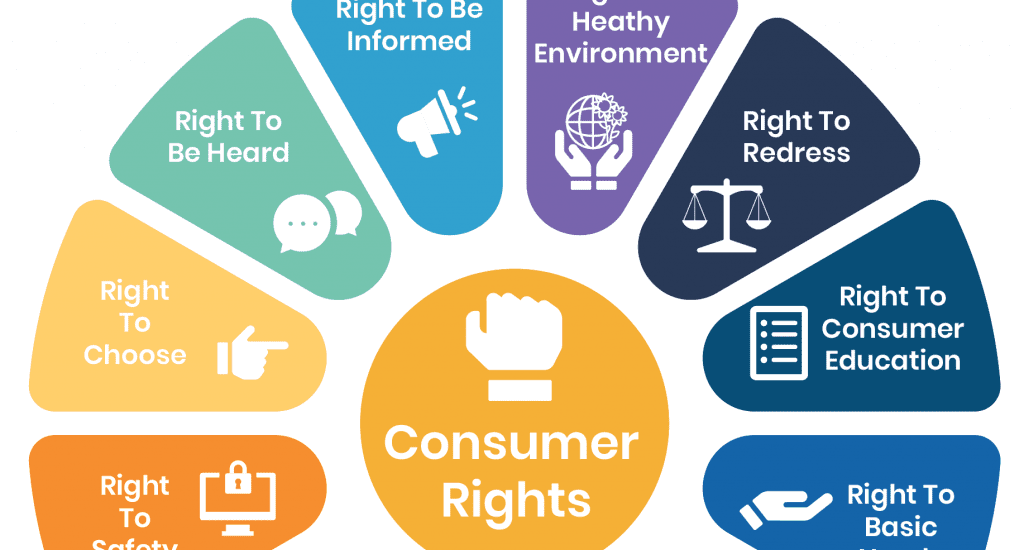



I am writing this article to give information about Consumer Rights, and to describe the rights & responsibilities of consumers that he/she must know to prevent exploitation with him/her that’s why these basic rights a consumer should know. Consumer courts are also described in this article.
Let’s break these words into two parts “Consumer” and “Rights” So now we have to understand both words and their meaning and after we will relate with each other.
● Consumer: A consumer is a person who consumes product and service
● Rights: Rights for consumers mean that they get the fundamental & protection that an individual has when purchasing a service or product.
So as we understand the rights that protect the dignity of a consumer by giving protection to their fundamentals when purchasing a service or product, Consumer rights allow customers to have the required information about goods and services while purchasing them are called Consumer rights.
➢ Right to Choose: The consumer has the right to choose from a variety of products at a competitive price.
➢ Right to be Informed: The buyer should be informed of all the necessary details regarding that product like MRP, Ingredients, Branding and etc.
➢ Right to Safety: Before buying, a consumer can insist on the quality and guarantee of the goods. They should ideally purchase a certified product like ISI or AGMARK.
➢ Right to be heard: This means that if a consumer has a complaint, they can talk about it at a place where it will be heard and taken seriously like consumer court.
➢ Right to seek compensation: This means that if a consumer is treated unfairly or taken advantage of, they have the right to ask for help and compensation to make things right.
➢ Right to Consumer Education: Consumers should be aware of his/her rights and avoid exploitation. Ignorance can cost them more.
Consumer responsibilities indicate that customers have a specific responsibility towards society and other consumers and help them fight against the unfair practices or at least be aware of it.
➢ Responsibility to be aware: A consumer has to be aware of the safety and quality of the products and services before purchasing them.
➢ Responsibility to think independently: Consumers should think carefully about what they want and need so that they can make their own choices confidently which leads to a good decision.
➢ Responsibility to speak out: Buyers/consumers should be fearless to speak out about their complaints and can tell traders what they exactly want.
➢ Responsibility to complain: Consumers have a duty to honestly and fairly voice their complaints about products or services by filing them.
➢ Responsibility to be an Ethical Consumer: They should be fair and avoid any tricky or dishonest actions.
The Consumer Protection Act, 1986 (COPRA) was passed by the Indian parliament and came into force on December 1986. The Act was passed to protect the consumers’ interest as well as to establish state bodies to deal with consumer problems and anything that arises thereof. Consumer courts were established as Consumer Dispute Resolution Agencies they deal
with consumer dispute types of cases. It is a forum where the consumer can file a case against the seller if a consumer feels that his/her rights have been exploited by the seller. The point of having a separate forum for consumer disputes is to ensure that such disputes are speedily resolved and make it less expensive.
Understanding and upholding consumer rights and responsibilities is vital for individuals in today’s scenario. Consumer rights ensure that customers are treated fairly, have access to accurate information, and can seek redress when necessary. They empower consumers to make informed choices while safeguarding their well-being. Simultaneously, consumer responsibilities involve being vigilant about product safety, making independent and thoughtful decisions, and speaking out when things go wrong. Ethical consumption practices are essential for maintaining a fair and transparent marketplace. Consumer courts, established under the Consumer Protection Act, serve as crucial avenues for addressing grievances and ensuring justice for consumers. These courts expedite dispute resolution and promote fairness in transactions. By knowing and exercising their rights while fulfilling their responsibilities, consumers can actively contribute to a marketplace that is honest, safe, and equitable for all.